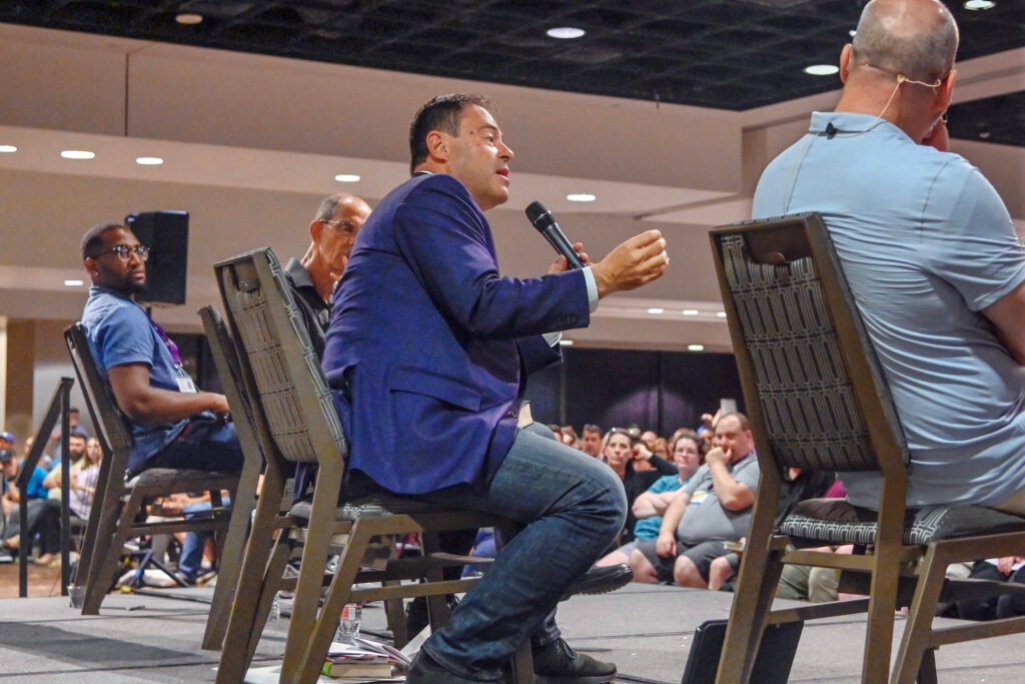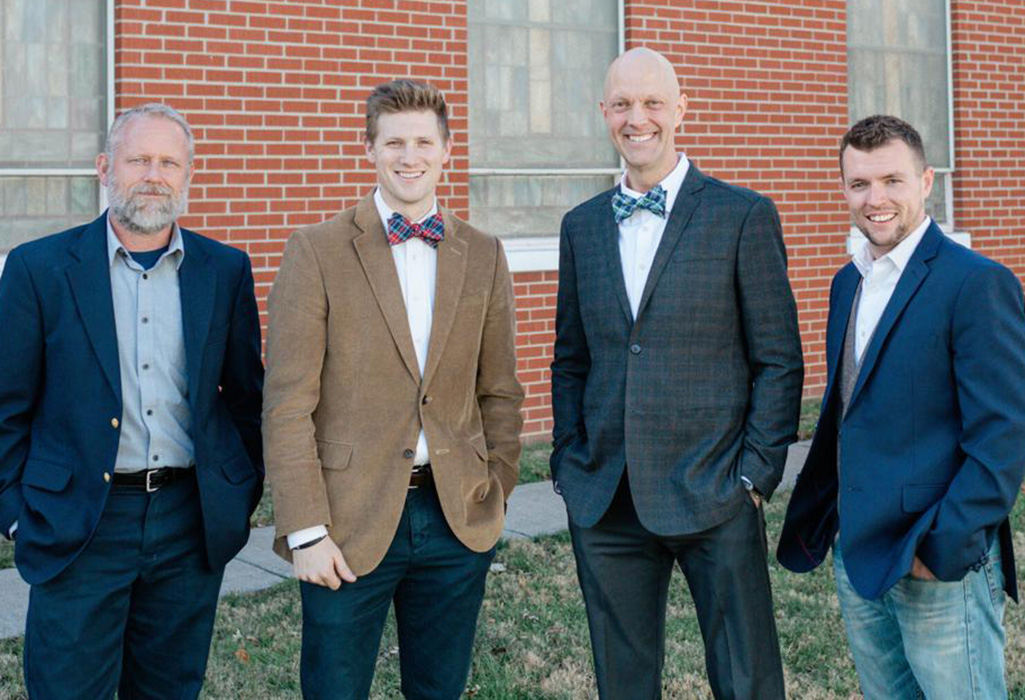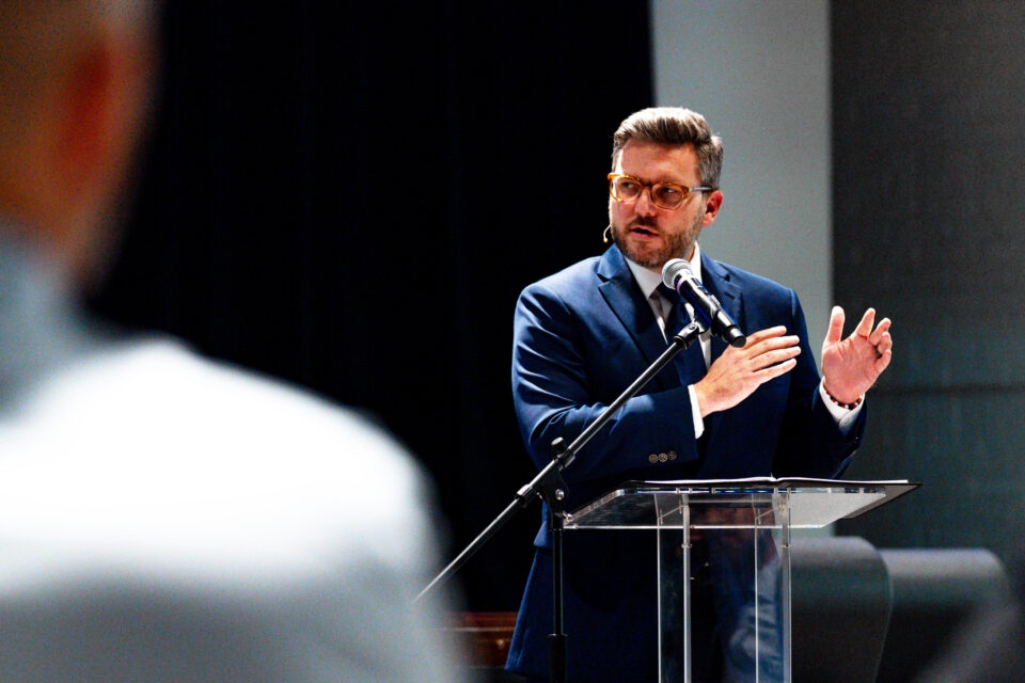
Mark Dever, pastor of Capitol Hill Baptist Church in Washington, D.C., and president of 9Marks, helps lead the discussion at the 9Marks at 9 event June 12 in New Orleans.
NEW ORLEANS (BP) – During two nights of discussion, IX Marks at 9 panelists discussed several issues impacting Southern Baptists at this year’s Southern Baptist Convention annual meeting in New Orleans, particularly the Convention’s decision to deny an appeal to two churches ruled “not in friendly cooperation” with the Convention in February.
Jonathan Leeman, the 9Marks editorial director, served as the emcee of both nights’ conversations. Mark Dever, pastor of Capitol Hill Baptist Church in Washington, D.C., and president of 9Marks, also took part in both evenings’ events. Other panelists of the two sessions included Southern Baptist seminary presidents and professors, as well as several local church pastors.
Leeman began Monday’s event with a 12-minute overview about whether the term pastor referred to an office or a gift in the New Testament. Among other topics, Leeman touched on arguments related to the difference between the role and the gift of the pastor, the pastor/shepherd as an Old Testament term, and a growing proliferation of church positions that include the title of pastor.
Responding to the charge that limiting the role of pastor to men downplays the involvement of women in Great Commission activities, Leeman suggested that a more vigorous congregationalism could help to change the conversation.
“We affirm the necessary and indispensable work of women in the church because they are priests – that’s another title,” Leeman said. “There’s another type of women’s contribution to the mission of the church that is not just important or vital or critical but is central and indispensable to the church’s mission and ministry. Why? Because they too are new covenant priests. … Is it the status of the pastor or elders our churches should exalt or the status of a Christian and being a new-covenant priest?”
On Monday (June 12), Virginia pastor Mike Law spoke to the SBC constitutional amendment he authored and that the SBC Executive Committee brought forward to messengers on Wednesday. Law described discovering that there were five nearby churches that had women serving on staff as pastors. Concerned that unbelievers in the community would be confused about what the Bible says about the role of pastor, he submitted an amendment to the SBC constitution to clarify the Southern Baptist position.
“We’re having this conversation because there are sisters in Christ serving as pastors in the Southern Baptist Convention that have come to light,” Law said. “And we’re at a moment about whether or not we are going to submit ourselves joyfully to God’s Word and his good design for his people.”
Law’s proposed amendment went on to be approved by two-thirds of messengers during annual meeting business Wednesday, June 14. It requires a second two-thirds vote at the 2024 meeting in order to be enacted.
Welton Bonner, a church pastor in residence at Capitol Hill Baptist Church, described the issue of the two appeals as one of love. “Is it most loving to disobey Scriptures to accommodate them?” Bonner said. “I think if we’re thinking soberly about it, then we recognize that love actually rejoices in truth.”
For the rest of Monday’s discussion, panelists focused their discussion on the role of pastor and its biblical qualifications.
Tuesday’s event began with a discussion of the day’s business, in particular the vote on the appeal of the churches earlier. Albert Mohler, who responded to the appeals of Saddleback Church and Fern Creek Baptist Church on the meeting floor, shared his thoughts about why the issue had come before the Convention this year, rather than earlier. He noted that many Southern Baptists thought they had the issue of female pastors behind them after the passage of the Baptist Faith and Message 2000, but the discovery of a number of churches within the SBC that had female pastors, brought the issue back before the Convention.
Mohler, president of the Southern Baptist Theological Seminary, said the SBC can’t act until a church is officially challenged, which happened in all three of the appeals cases the Convention heard on Tuesday.
“Rick Warren brought this to the SBC’s attention,” Mohler said. “So this is a new thing and a different category. It was a public challenge to the SBC from day one. Had this happened in a small church in California, which had no particular publicity, and if the pastor wasn’t on social media making his argument, it may not have been known until some faithful church in the area with knowledge, said this is inconsistent with being in friendly cooperation with the SBC and then has to file some kind of challenge.”
To show the evangelistic impact of Southern Baptist women, Dever reenacted an action he asked attendees to do the night before, to stand if they came to faith in Christ at age 11 or younger. Then he asked everyone whose mother didn’t play a significant role in their conversion to sit down. At that point, much of the room remained standing.
“OK friends, there’s the Great Commission,” Dever said. “We thank the Lord for mothers and sisters, who don’t need any church’s permission to share the Gospel with their children. That’s how most people get into our churches.”
The panelists also discussed other issues related to the 2023 annual meeting, including the declining impact of mega-churches and the effects of cultural changes on Southern Baptist churches.
Panelists concluded the meeting by describing their feelings about the current state of the Convention. Although responses varied, all were positive, with several using the word, “encouraged” and “hopeful.”
“I’m encouraged by how seriously we’re taking what we believe and how important it is for our practices,” said Juan Sanchez, senior pastor of High Pointe Baptist Church in Austin, Texas.


